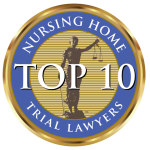
Sexual assault is inevitable when nursing homes prioritize profits over resident safety, with low staff wages, frequent turnover, poor pre-hiring screening, and insufficient supervision.
Our lawyers are adept at investigating these assaults to uncover the systemic mistakes contributing to such incidents.
Sexual abuse lawyers like us scrutinize staffing levels, background check practices, oversight, policy training, enforcement, and follow-up on complaints and abuse indicators.
Consultations For Nursing Home Issues
Years of
Experience
Recovered
For Clients
Years of Recognition on Super Lawyers
Superb Rating
on Avvo







Our fulfillment as attorneys comes not only from the successful outcomes we secure for our clients but also from knowing that we are part of a larger movement toward accountability and improved care in nursing homes.















Any non-consensual sexual contact is considered sexual abuse. Besides rape, sexual abuse in nursing homes includes coercion, improper contact, harassment, and explicit photos.
For example, a nursing home resident could be coerced, manipulated, tricked, or even drugged into unwanted sexual contact. Also, a nursing home resident might be too frail, mentally incapacitated, or sick to give consent.
It’s vital to know exactly what to look for!

Negligence in screening, monitoring, and supervision of staff can lead to resident sexual assault, rendering the facility liable.
Certain nursing homes can be dangerously simple to break into, especially with insufficient security and staffing.
Nursing homes must prevent the possibility of resident-on-resident sexual assault, particularly if residents are unable to defend themselves.
A nursing home sexual assault lawyer can help families report abuse to the police and represent them with the prosecutor.

Here are some actions to take to prevent sexual abuse in nursing home residents:
With a personalized approach to each case, our team offers guidance and support beyond legal advice.
Analysis to understand the extent and cause of injuries
Open dialogue to address your fears and concerns
Improving safety standards across all of Ohio
If your loved one was sexually assaulted in a nursing home in Ohio, the first step is to ensure their safety and obtain immediate medical care. Then ensure you (and/or the nursing home) report the incident to the police and the Department of Health. Federal law under the Nursing Home Reform Act and Ohio Revised Code Section 3721 require facilities to protect residents from abuse. Report the incident promptly to local law enforcement and the Ohio Department of Health.
Here’s a checklist of what you can do if your loved one is sexually assaulted in a nursing home:
Immediate Action Steps
Reporting & Advocacy Steps
Follow-Up & Monitoring Steps
An experienced Ohio nursing sexual assault lawyer like Eadie Law’s attorneys can investigate whether the facility failed in its duty, such as inadequate supervision or negligent hiring. Taking swift steps protects your loved one and strengthens the potential for justice.
Sexual abuse is one of the most underreported forms of elder mistreatment, particularly in long-term care facilities, according to research by the U.S. Department of Justice and National Center on Elder Abuse shows. Many residents cannot or will not speak up due to fear or cognitive decline.
When considering how common sexual assault in nursing homes is, it’s important to know that even one case is too many. Ohio law requires facilities to report all allegations of abuse immediately, but underreporting remains a challenge. Awareness and vigilance from families play a critical role in protecting residents.
Families often wonder what the signs of sexual abuse in a nursing home look like. Indicators can be physical, emotional, or behavioral. Because residents may not be able to communicate clearly, careful observation is key.
When asking what the signs of sexual abuse in a nursing home are, remember that even subtle changes may indicate deeper problems. Prompt medical evaluation and legal consultation are crucial.
If your loved one was harmed, you may ask who can be held responsible for sexual assault in a nursing home. Liability may rest not only with the abuser (whether an employee, resident, or stranger) but also with the facility. Ohio law and federal CMS regulations mandate resident safety and prohibit abuse of any kind.
When questioning who can be held responsible for sexual assault in a nursing home, possible defendants include negligent staff, administrators who ignored red flags, the facility itself for poor hiring and supervision practices, and parent companies / management companies. A skilled nursing home sexual assault lawyer like those at Eadie Law can help identify all responsible parties and hold them accountable.
Yes, Ohio civil law allows victims and families to file lawsuits for negligence, failure to protect, and violation of residents’ rights if the nursing home has responsibility. Ohio Revised Code Section 3721.13 specifically guarantees residents the right to be free from abuse.
When determining whether you can sue a nursing home in Ohio for sexual assault, know that damages may include medical expenses, emotional distress, wrongful death damages if applicable), and in some cases punitive damages. Filing suit not only seeks compensation but also helps drive change within negligent facilities.
Families often ask what federal protections exist for nursing home residents against sexual abuse. The Nursing Home Reform Act, enforced by the Centers for Medicare & Medicaid Services (CMS), requires facilities to provide care free from abuse, neglect, and exploitation. Violations can result in penalties, including fines and loss of Medicare or Medicaid funding.
When considering what federal protections exist for nursing home residents against sexual abuse, it’s important to know that the Older Americans Act also promotes safety and dignity for elderly individuals. These federal protections create strong legal rights, but enforcement often requires legal advocacy.
If you’re wondering what Ohio laws protect nursing home residents from sexual assault, key provisions include Ohio’s Resident’s Rights Law (Revised Code Section 3721), which grants residents the right to dignity, safety, and freedom from abuse, as well as criminal law. The Ohio Department of Health oversees nursing home licensing and investigates reported violations.
When asking what Ohio laws protect nursing home residents from sexual assault, families should know that facilities violating these rules may face regulatory action, lawsuits, and even criminal liability. These laws exist to safeguard vulnerable residents, but families must often take action to see them enforced.
Families often ask how to report sexual abuse in an Ohio nursing home. Start by calling 911 if your loved one is in immediate danger. You can also file a report with the Ohio Department of Health, which investigates nursing home abuse complaints. Adult Protective Services may also become involved.
When considering how to report sexual abuse in an Ohio nursing home, keep detailed records of what you observed and who you spoke with. Reporting through multiple channels strengthens accountability and ensures authorities take action.
The Ohio Department of Health licenses and regulates nursing homes, ensuring compliance with state and federal standards. When a report is filed, investigators may conduct on-site visits, interview staff, and review records.
When considering what role the Ohio Department of Health plays in nursing home sexual assault cases, remember that while the agency can issue citations, fines, or revoke licenses, these actions do not compensate victims. Civil lawsuits may still be necessary to recover damages for your loved one.
Ohio law guarantees residents the right to dignity, privacy, and freedom from abuse under Ohio Revised Code Section 3721.13. They also have the right to file complaints without retaliation and to seek medical and legal assistance. And like all Ohio residents, they are protected by Ohio criminal law.
When evaluating what rights Ohio nursing home residents have after sexual abuse, it’s important to know that victims can pursue both regulatory complaints and civil lawsuits. These rights empower families to demand accountability and protect loved ones from further harm.
In Ohio, the answer is yes. Sexual assault is a felony under Ohio Revised Code Section 2907, and offenders face prison time, fines, and sex offender registration. Criminal cases are separate from civil lawsuits but can proceed at the same time.
When considering whether nursing home staff can be criminally charged for sexual assault, remember that criminal prosecution seeks punishment, while civil claims provide compensation and accountability for victims. Both paths are important for justice.
Key evidence in a nursing home sexual assault case includes physical evidnce from closthing and rape kits or SANE examinations, surveillance video, history of the employee or resident conduct, medical reports, staff schedules, witness statements, and facility logs. Security footage and internal records may be critical for proving negligence in a nursing home sexual assault case.
When asking what evidence is important in a nursing home sexual assault case, remember that timing is vital. Evidence can disappear quickly, so engaging a lawyer early helps preserve crucial documentation and strengthens your case.
In an Ohio nursing home sexual assault lawsuit, victims may pursue both economic and non-economic damages. Economic losses include medical care and counseling, while non-economic damages compensate for pain, suffering, and trauma. If the victim dies from the injuries, the next of kin may be entitled to wrongful death damages for their grief and loss.
When considering what damages can be recovered in an Ohio nursing home sexual assault lawsuit, punitive damages may also apply in severe cases to punish egregious misconduct. Every case is unique, and a nursing home sexual assault lawyer at Eadie Law can help evaluate full compensation options.
Families often ask if a nursing home can be liable if a resident assaults another resident. In Ohio, facilities must supervise and protect residents from foreseeable harm. If the facility knew a resident or employee posed a threat and failed to act, it may be liable.
When asking if a nursing home can be liable if a resident assaults another resident, the answer depends on factors like prior incidents, staffing, and safety measures. Negligent supervision is a frequent basis for liability.
If you’re wondering how understaffing contributes to sexual assault in nursing homes, inadequate staffing creates gaps in supervision that allow abuse to occur. Overworked employees may miss warning signs or fail to protect residents.
When asking how understaffing contributes to sexual assault in nursing homes, it’s important to know that CMS regulations require enough staff to meet residents’ needs. Chronic understaffing is one of the most common causes of abuse and negligence.
Families often ask what role negligent hiring plays in nursing home sexual assault cases. Facilities must conduct background checks and verify employment history to screen out dangerous employees.
When considering what role negligent hiring plays in nursing home sexual assault cases, know that a facility can be liable if it hires or retains someone with a known history of abuse or criminal conduct. Proper screening is a legal and moral duty.
Under Ohio Revised Code Section 2125, you can file a wrongful death claim if negligent sexual assault led to your loved one’s death, seeking compensation for funeral costs, emotional loss, and suffering.
When determining if you can file a wrongful death claim after sexual assault, remember that these cases hold negligent facilities accountable for the most tragic outcomes. An experienced attorney can guide you through this process.
How long you have to file a lawsuit for nursing home sexual assault in Ohio depends on several factors, and could be a short as one year for “medical claims,” or two years for assault and wrongful death.
When asking how long you have to file a lawsuit for nursing home sexual assault in Ohio, act quickly. Delays can harm your case by allowing evidence to disappear. Early consultation with a sexual abuse lawyer helps ensure you meet that deadline.
If you’re wondering how to protect your loved one from further harm after reporting sexual abuse, ensure they are relocated or separated from the abuser. Request increased supervision and document all care interactions.
When considering how to protect your loved one from further harm after reporting sexual abuse, ongoing vigilance is essential. Continued legal and medical support helps maintain their safety and dignity.
Families often ask if sexual assault in nursing homes can be prevented. While not every risk can be eliminated, strict hiring practices, proper training, and supervision significantly reduce abuse incidents.
When considering whether sexual assault in nursing homes can be prevented, vigilance from staff and management is key. Facilities must enforce safety policies and foster transparency to protect residents.
Families often ask how sexual assault impacts nursing home residents emotionally. The effects can be severe, leading to depression, anxiety, and fear, even in residents with dementia.
When considering how sexual assault impacts nursing home residents emotionally, it’s important to remember that trauma can also worsen cognitive decline or medical conditions. Supportive counseling and advocacy are essential.
Families often wonder how to tell if a loved one is too afraid to report sexual abuse. Signs may include sudden silence, fear around staff, or reluctance to discuss injuries.
When asking how to tell if your loved one is too afraid to report sexual abuse, understand that many victims fear retaliation or disbelief. Compassionate communication and legal support can uncover the truth.
If you’re asking whether nursing homes are required to investigate sexual assault allegations, yes—they are legally obligated to. Federal CMS regulations and Ohio law require immediate reporting and thorough investigation.
When considering whether nursing homes must investigate sexual assault allegations, failure to do so can lead to penalties and civil liability. Accountability begins with transparency.
Families often ask how civil and criminal cases differ in nursing home sexual assault. Criminal cases punish offenders, while civil cases seek compensation for victims.
When evaluating how civil and criminal cases differ in nursing home sexual assault, both paths can proceed together. Civil suits provide financial recovery even if no criminal conviction occurs.
Families often ask what role Adult Protective Services (APS) plays in sexual assault cases. APS investigates abuse, neglect, and exploitation reports involving vulnerable adults.
When considering what role APS plays in sexual assault cases, note that while they can protect residents and coordinate with law enforcement, they do not represent victims legally.
If you’re wondering whether arbitration agreements can prevent you from suing a nursing home, some contracts attempt to require private arbitration instead of court. However, courts may void unfair agreements.
When asking if arbitration agreements prevent you from suing a nursing home, a lawyer can review your contract and challenge invalid provisions so you can still seek justice.
Families often ask how long a nursing home sexual assault lawsuit takes in Ohio. Timelines vary based on complexity and court schedules, but cases often take several months to years.
When considering how long a nursing home sexual assault lawsuit takes, remember that thorough investigations take time. Patience ensures stronger evidence and better results.
If you’re asking whether staff members who witnessed abuse can be held accountable, the answer is yes. Under Ohio law, all nursing home employees are mandated reporters.
When considering if staff who witnessed abuse can be held accountable, know that failure to report suspected abuse may result in legal and disciplinary consequences.
Families often ask what to expect during a legal consultation about nursing home sexual assault. The attorney will review details, records, and options confidentially.
When asking what to expect during a legal consultation, know that the goal is to explain your rights clearly and help your family plan next steps without pressure.
If you’re asking what steps to take now if you suspect sexual assault in a nursing home, take immediate action. Call 911 if danger exists, seek medical attention, and report to the Ohio Department of Health.
When determining what steps to take now if you suspect sexual assault in a nursing home, document every detail and consult an experienced Ohio nursing home injury lawyer. Acting quickly protects your loved one and your legal rights.
There are few things worse than being sexually assaulted, and no worse type of assault than attacking people who are helpless or infirm. Sadly, elderly victims of sexual assault are far too common.
Go to the section to read more about the definition of sexual abuse in nursing homes.
Sexual abuse can take many forms including:
Sexual abuse can come at the hands of nursing home staff members, other residents, and strangers. Read this section to read more on Who Commits Nursing Home Sexual Abuse?
If you suspect you or a loved one in a nursing home has fallen victim to sexual abuse, report the incident to the authorities.
Here at Nursing Home Injury Lawyers, we focus on cases involving serious injuries resulting from nursing home abuse and neglect, including incidents of sexual assault. If you’d like to discuss your situation, feel free to give us a call at 866-642-2873.
Our nursing home sexual assault lawyers help hold nursing homes accountable and recover for those harms and losses.
Eadie Law handles serious injuries caused by abuse and neglect including cases of sexual assault. We serve all of Ohio so it doesn’t matter where you are in the state.
If you need assistance or have questions, don’t hesitate to reach out to us by phone at 866-642-2873.
In Ohio, unfortunately, misguided “tort reform” has resulted in the limitation of damages available for emotional harm.
It is important for you to contact the best attorney with practice areas restricted to elderly sexual abuse cases to help you navigate through these complicated issues. Understanding these rules is crucial.
The Department of Health and Human Services (HHS) estimates that every year, around five million nursing home residents suffer from abuse, neglect, or exploitation. Another report by HHS found that a shocking 85% of nursing homes reported at least one case of abuse or neglect.
There may be a large number of unreported cases of elder mistreatment in nursing homes because residents are often physically vulnerable and unable to protect themselves or report abuse. Therefore, the statistics are likely much higher, indicating a significant problem of abuse in nursing homes according to The National Research Council.

